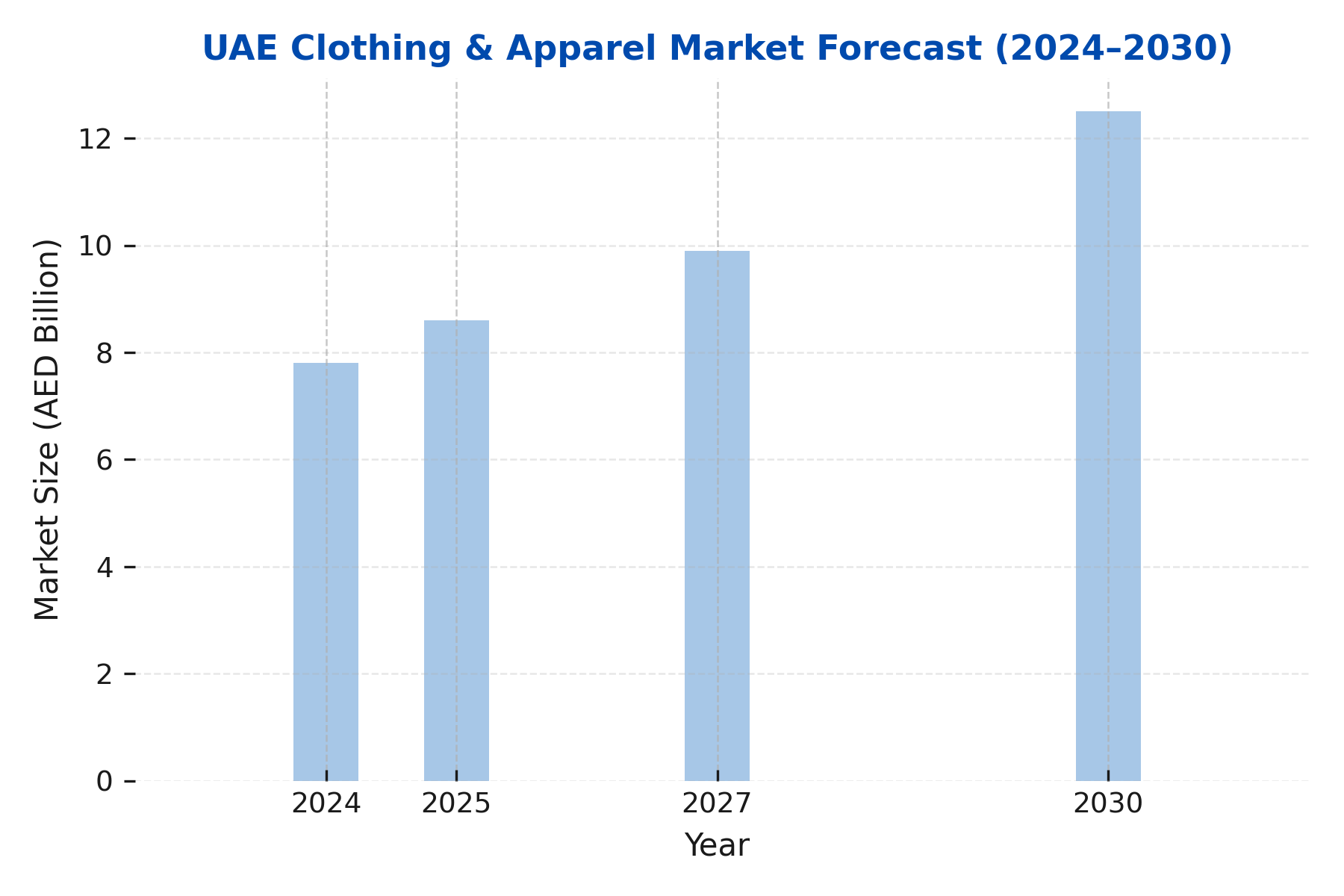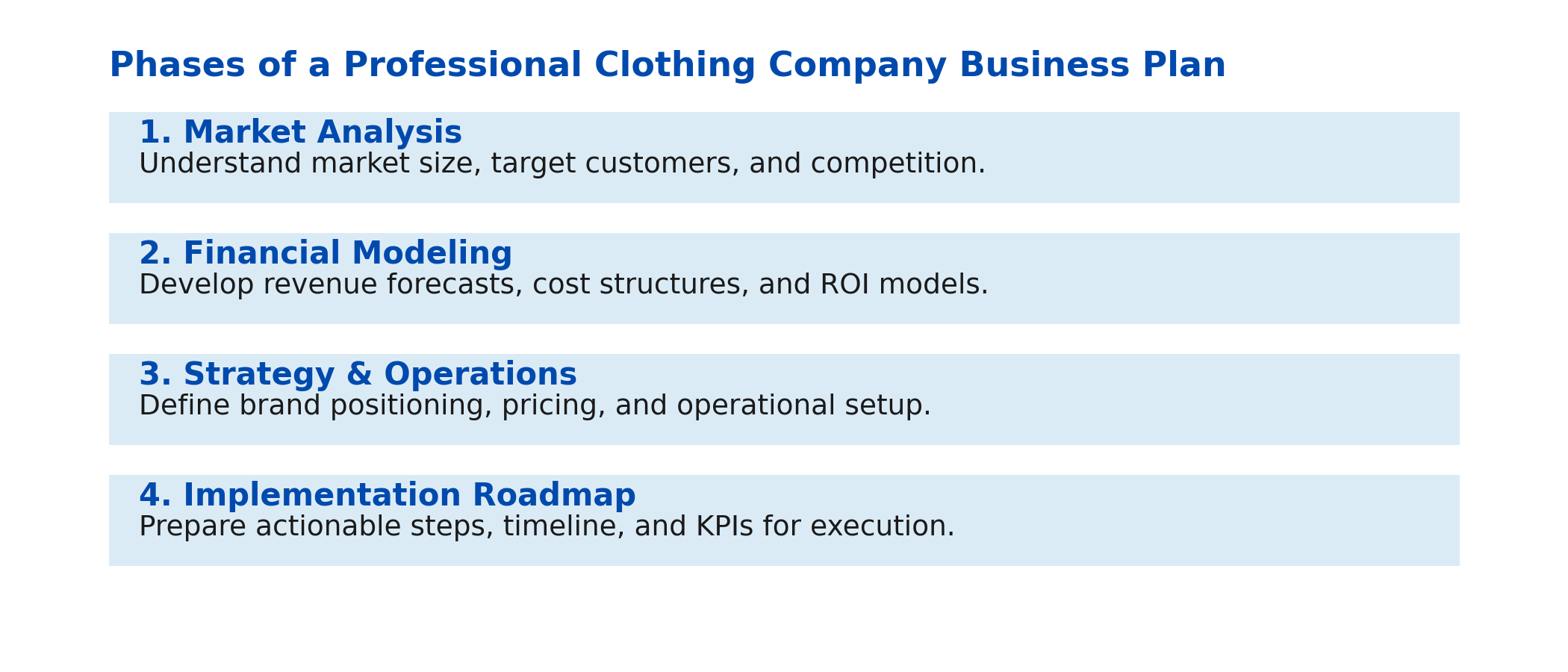Launching a clothing brand in the Gulf today is more than a creative dream — it’s a business opportunity shaped by one of the fastest-growing retail markets in the world. Whether you’re inspired by Dubai’s fashion-forward culture, Saudi Arabia’s booming retail sector, or regional demand for sustainable and modest fashion, success begins with a solid business plan.
This article was written by Accurate Middle East Research & Consulting, a Dubai-based firm specializing in market research, feasibility studies, and business planning across the GCC. Our goal is simple: to show future entrepreneurs what a professional clothing company business plan should include — and why it is worth having it prepared by experts who understand the realities of entering the UAE and Saudi markets.

Clothing Company Business Plan: Step-by-Step Guide and Template
Why You Need a Business Plan for a Clothing Company
A great design concept or unique product idea is only the first step. In the GCC, where startup costs are high and competition is growing, investors and partners expect a clear business plan before committing funds or approvals.
A well-structured business plan helps you:
- Evaluate the market potential before investing.
- Identify the right niche (modest fashion, luxury, streetwear, children’s apparel, uniforms, etc.).
- Estimate realistic financial requirements.
- Convince investors or banks that your project is viable.
- Avoid costly mistakes when registering your company or selecting suppliers.
In markets like Dubai, Riyadh, and Doha, a professional business plan is not only a financial document — it’s a market-entry strategy that shows regulators, landlords, and partners you know exactly where you’re heading.
What a Clothing Company Business Plan Should Include
At Accurate Middle East, our consultants structure every plan to answer three questions:
Is there demand? What will it take to enter? And how fast can it become profitable?
Below is a simplified outline that forms the foundation of every clothing company business plan:
1. GCC Clothing Market Size and Overview
An analysis of the GCC apparel market, including consumer trends, import-export data, pricing corridors, and regulatory frameworks. For example, in the UAE, the fashion market exceeded USD 6 billion in 2024, with annual growth projected at 5–7% led by online retail and premium local brands (source). Understanding this context defines your positioning.
2. Target Customer and Market Segmentation
Identifying the core audience — nationality mix, gender, spending habits, and lifestyle drivers.
A plan for a modest fashion line will differ greatly from one focused on resort wear or corporate uniforms.
3. Competitive Landscape
Benchmarking existing brands, pricing models, store formats, and online presence. This section clarifies how your concept fits into — or disrupts — the existing market.
4. Brand and Product Strategy
Defining your collection mix, brand story, and product roadmap. We advise specifying how often new collections will launch, what differentiates your designs, and how you’ll manage sourcing and quality.
5. Operations and Supply Chain
A roadmap for sourcing materials (local or international), production models (own manufacturing, outsourcing, or private label), and logistics to the UAE or Saudi Arabia. Many new entrants underestimate the complexities of customs clearance and warehousing — both of which can significantly affect cost and timelines.
6. Marketing and Sales Plan
Channels (own store, e-commerce, distributors, pop-ups), digital marketing strategy, influencer collaborations, and conversion metrics. This section defines how you plan to reach customers, not just create awareness.
7. Financial Plan
Comprehensive 3–5-year projections covering capital requirements, operating costs, breakeven analysis, and ROI. This is the core of the document for investors and banks.
8. Implementation Timeline
Clear milestones: licensing, product launch, marketing roll-out, and first-year KPIs.
9. Risk and Regulatory Review
Identification of compliance risks, import duties, and licensing challenges in each market — particularly relevant for Saudi Arabia and the UAE, where foreign ownership rules, free zone vs. mainland setup, and product labeling standards vary.

Clothing Company Business Plan: Step-by-Step Guide and Template
Why Work with a Professional Consulting Company
Many entrepreneurs begin writing a business plan using free templates — only to realize that investors, banks, and government authorities in the GCC require much more depth and local context.
A professional consulting firm like Accurate Middle East brings several advantages:
- Market data access: verified statistics from Dubai Chamber, Saudi Ministry of Commerce, and UN Comtrade.
- Real financial modeling: cost-per-unit, logistics, import duties, rent benchmarks, and breakeven models specific to GCC.
- Feasibility validation: stress-testing assumptions to confirm that your project can realistically reach profitability.
- Investor-ready formatting: all numbers and visuals presented to international standards.
- Local expertise: understanding licensing options, supplier networks, and regulatory specifics for fashion and textile businesses.
When clients approach us after trying to build a plan on their own, the most common comment we hear is “We had the idea — but we didn’t know what we didn’t know.”
Challenges of Starting a Clothing Company in the UAE and Saudi Arabia
The GCC fashion industry offers potential — but also entry barriers that a newcomer must plan for.
| Challenge | Description | Impact if Not Addressed |
| Market saturation | Strong presence of established global and regional brands in malls and online. | Difficult to compete on price or visibility without a clear niche. |
| High setup and rental costs | Retail spaces in Dubai and Riyadh can be among the most expensive in the region. | Poor cash-flow management, early closure risk. |
| Licensing & approvals | Fashion activities fall under multiple categories — trading, design, manufacturing. | Delays or compliance issues if setup type is wrong. |
| Supply chain complexity | Import duties, delivery timelines, supplier reliability. | Increased lead times and production costs. |
| Changing consumer tastes | Rapid shifts driven by influencers and social media. | Unsold inventory, brand misalignment. |
A professional feasibility study mitigates these risks by quantifying each factor before investment.
Average Cost and Timeline to Start a Clothing Company in the UAE
| Phase | Estimated Cost (AED) | Typical Duration |
| Company registration (mainland or free zone) | 12,000 – 20,000 | 2–4 weeks |
| Trade license & permits | 5,000 – 10,000 | 1–2 weeks |
| Retail space / showroom setup | 80,000 – 250,000 | 2–3 months |
| E-commerce setup | 15,000 – 30,000 | 3–6 weeks |
| Initial marketing & branding | 25,000 – 60,000 | Continuous |
| First inventory & logistics | 100,000 – 300,000 | 2–3 months |
| Average total (launch phase) | 250,000 – 600,000 AED | 3–6 months |
Costs vary depending on format (boutique, streetwear, online-only) and location (Dubai Design District, Mall of Arabia, or KSA’s Riyadh Front). Our consultants always provide a full financial model before setup.

Clothing Company Business Plan: Step-by-Step Guide and Template
Case Example 1: Boutique Fashion Brand Entering Dubai
A European designer approached Accurate ME to assess whether her eco-friendly women’s line could succeed in Dubai.
Our team conducted:
- Market segmentation of sustainable apparel buyers in the UAE.
- Benchmark of 20 competitor brands by price, style, and positioning.
- Feasibility model with rent and duty assumptions.
Result: within four months, she opened a small studio in Al Quoz and an online store, achieving profitability in her second collection cycle.
Case Example 2: Saudi Uniform Manufacturer Expanding to UAE
A Riyadh-based uniform producer wanted to expand to serve UAE hospitality and healthcare sectors.
Accurate ME prepared a detailed market entry business plan with:
- B2B market size for uniforms across sectors.
- Cost comparison of production in KSA vs. UAE.
- Licensing and customs guidance.
Outcome: the company secured a Dubai partner and launched local operations within six months, reducing logistics cost by 22%.
Why Choose Accurate Middle East
We are not a template-selling platform — we are a boutique consulting firm that treats every project as a unique market opportunity.
Our consultants combine backgrounds in strategy, finance, and local market research, offering end-to-end support from idea validation to investor presentation.
Working with Accurate ME means:
- Direct access to senior consultants with GCC expertise.
- Tailored reports and data — no generic assumptions.
- Fast turnaround: full business plan within 10–15 days.
- Transparent pricing and confidentiality.
- Complimentary sample business plan upon request and a 30-minute free consultation to discuss your project.
How We Can Help
If you’re considering launching a clothing company in the UAE, Saudi Arabia, or elsewhere in the GCC, our team can prepare a comprehensive business plan and market analysis designed to meet investor and regulatory expectations.
We also support clients with:
- Feasibility studies and demand estimation.
- Financial modeling with ROI and payback analysis.
- Market entry strategy and operational setup guidance.
- Brand and pricing positioning for both retail and B2B apparel segments.
Talk to Us
The fashion industry in the Gulf is evolving quickly — those who act now gain the advantage. Whether you need a sample clothing company business plan, a market research report, or a full feasibility study, our consultants are ready to help.
For inquiries, consultations, or tailored proposals, contact Accurate Middle East Research & Consulting directly via WhatsApp at or call us in the UAE at +971 50 599 5603.
You can also request a callback or schedule a free consultation by clicking the button below.
If you’re interested in market research or business planning services, simply fill in our brief form — and receive a customized proposal within 24 hours.
We’re here to support your business ambitions across the UAE, Saudi Arabia, and the GCC — from the first sketch to your first store opening.
© Accurate Middle East Research & Consulting – All rights reserved.
Read Next: Smart Fire Detection & Extinguishing Market Study
Accurate Middle East recently completed an in-depth market research and feasibility study on the Smart Fire Detection and Extinguishing Systems market in the GCC. The study explored technological adoption trends, competitive dynamics, regulatory frameworks, and investment potential across commercial, industrial, and infrastructure segments. As the region accelerates smart-city development and safety standards, demand for intelligent fire protection systems is expected to rise sharply, driven by innovation and local manufacturing initiatives.
👉 Explore Smart Fire Detection & Extinguishing Market Study →




